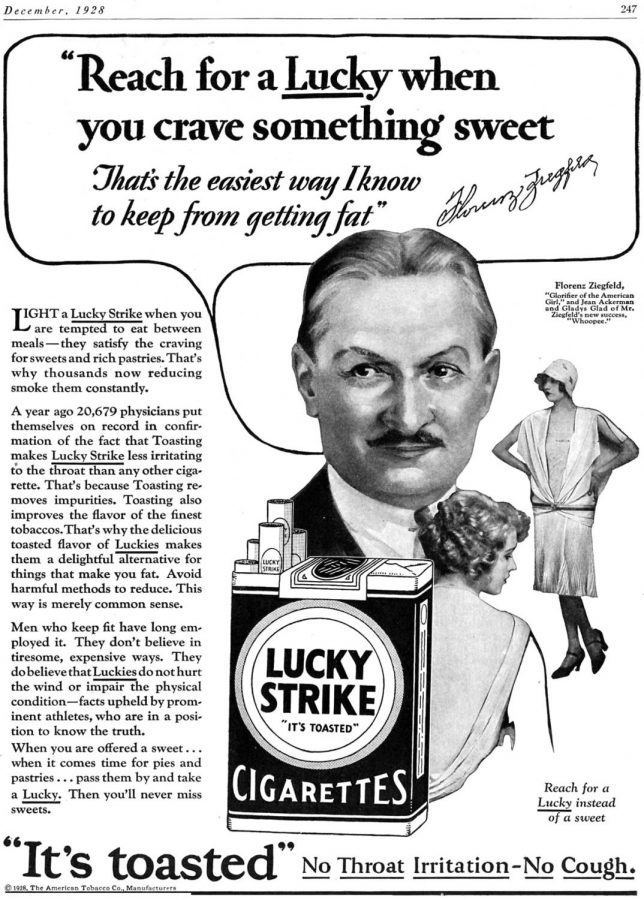Hundreds of Years of Fads
How dieting fads have changed throughout history
A Lucky Strike cigarette dieting ad that claims that cigarettes will curb sweet cravings
While it seems that dieting and searching for the ‘perfect body’ has been engraved just recently into our modern culture, the idea of dieting has been around for centuries, ranging from Ancient Greece to jazzercising and beyond.
“For vast periods of history, people just ate what was available to them,” explained Lisa Herzl, history teacher and program coordinator for the history department, “For us today, to be able to be selective in what we eat is a massive privilege.”
The article “The Ancient Origins of Dieting,” from The Atlantic, explains that the word ‘diet’ comes from the Ancient Greek diatia, which described the ideal life balance of nourishment, exercise, and social life, but which grew to encompass Judeo-Christian views on “gluttony, temptation, and morality” that “condemned fat as sin written on the body.” Such concepts became married with the Greek’s diatia and carried through the centuries, but it wasn’t until new agricultural techniques led to a surplus of food that the ancient ideas came to the forefront again.
In an informational slideshow “Diets Through History: The Good, the Bad, and the Ugly,” from Health, one of the first diets to become popular was that of the Vinegar and Water Diet, which relies on drinking a concoction of water and apple cider vinegar to lose weight. However, to have a few extra pounds was actually seen as a sign of wealth, so dieting was not widespread, especially among the poor and peasant classes.
“Basically, before modern advertising, it would be considered good if someone was a little heavy,” explained Chad Richard, the US 2 and APUSH teacher here at Triton. “It meant that they were healthy and had a good diet and food and money for it. Somewhere around the twenties, more of our modern concepts of body sizes and frames started to slowly build.”
The twentieth century saw a larger wave of diet trends, especially geared toward women, beginning with the cigarette brand Lucky Strike claiming that the nicotine in their cigarettes could suppress an appetite for sweets. Though cigarettes can cause weight loss, it is well known now that their adverse effects on the lungs and throat, just to name a few, far outweigh the positive.
The introduction of Weight Watchers, still popular today, came in 1963 as physical activity decreased and food surplus remained high, while celebrities such as Elvis Presley followed the Sleeping Beauty Diet which elicits weight loss through sedation for many hours or days. The seventies gave way to dieting pills, beginning with dexatrim which had be taken off of the market in the 2000s after one of its ingredients, phenylpropanolamine (PPA), was linked to an increased risk of strokes. Harper’s Bazaar’s article “The Most Popular Diet The Year You Were Born” mentions how the early 2000s gave way to ‘healthy fast food,’ showcasing Jared Fogle who lost 200 pounds eating at Subway. Now Fogle is more well known for pleading guilty on federal charges to possession of child pornography and “traveling to pay for sex with minors.”
For decades, dieting has been deeply rooted in our society, with teens and adults learning more and more to be wary of new weight loss products. Senior Jonathan Reilly claims that extra research would be warranted if he were to try a dieting trend.
“If I were to try one, I would want to believe what I’d seen on TV, but I definitely would do more research because I’ve heard things that aren’t too good about certain dieting trends,” said Reilly.
Senior Alice Thornton had similar concerns as Reilly, especially depending on the source of the weight loss hack.
“It depends on the source,” explained Thornton, “if it’s a news source, probably I’d think about it, but if its social media or something like that I would be a little biased.”
Melissa Wdowik wrote in the article “The Long, Strange History of Dieting Fads” from theconversation.com, that “the history of dieting shows vanity outweighs common sense.” After hundreds of years, the question of what is desired and how to achieve it has not been answered, even as years of fads and trends have come and gone. Even now, in an age of science and self-confidence, the question remains: why do we diet?
“The idea of what the perfect body type is has changed so much overtime,” reiterated Herzl. “I think we want solutions to things and what we eat is something we can control.”
Informational Works Cited
Harper’s Bazaar Staff. “The Most Popular Diet The Year You Were Born.” Harper’s Bazaar, Hearst Communications, 12 November 2018,
https://www.harpersbazaar.com/beauty/diet-fitness/g15893190/popular-diet-the-year-you-were-born/?slide=30
President’s Council on Sports, Fitness, and Nutrition. “Facts and Statistics.” HHS, US Department of Health and Human Services, 26 January 2017,
https://www.hhs.gov/fitness/resource-center/facts-and-statistics/index.html
Unknown. “Diet Similarity.” National Geographic Magazine, National Geographic Society, 2014,
https://www.nationalgeographic.com/foodfeatures/diet-similarity/
Rotchford, Lesley. “Diets Through History: The Good, The Bad, and Scary.” Health, Meredith, 2018,
https://www.health.com/health/gallery/0,,20653382,00.html
Twilley, Nicola, et.al. “The Ancient Origins of Dieting.” The Atlantic, The Atlantic Monthly Group, 30 January 2018, https://www.theatlantic.com/health/archive/2018/01/the-ancient-origins-of-dieting/551828/
Wdowik, Melissa. “The long, strange history of dieting.” The Conversation, The Conversation US, 6 November 2017, http://theconversation.com/the-long-strange-history-of-dieting-fads-82294

Hi, my name is Jacqueline Downs, 18, and I am a senior at Triton. While this is my first year in Journalism, so far I have really enjoyed reporting on...










